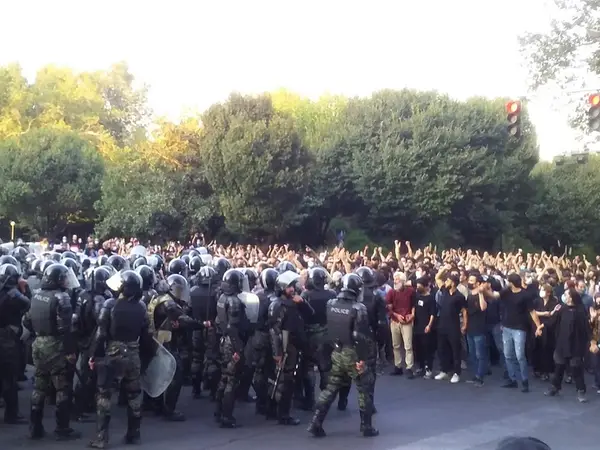An Iranian lawmaker has joined other politicians and analysts in warning the government that prolonged economic crisis could lead to a fresh wave of protests.
Mohammad Hassan Asafari Conveyed his concerns to the Didban Iran [Iran Monitor] website in Tehran that the government should not assume that the people will remain silent in the face of rising prices and other economic problems. He emphasized that there is no guaranty Iranians would always remain quiet regardless of the government’s performance.
Didban Iran noted that previous protests in 2018 and 2019 were driven by economic motives. Even last year's protests, which primarily revolved around political and cultural issues, at times revealed underlying economic grievances among the population. Iranian sociologists have repeatedly warned that economic problems have the potential to spark further protests in Iran.
Asafari pointed out the government's weak track record in addressing the country's economic problems, which could potentially trigger another round of protests due to increasing prices.
The lawmaker also drew attention to the fact that foreign sanctions disproportionately impact the lower and middle classes, as inflation hovers around 50 percent and the income gap widens.
Regime insiders holding lucrative posts in the government and the state-controlled economy, getting a much bigger share of the wealth, has been a growing problem in Iran for the past decade.
Didban Iran reiterated that the protests in 2018 and 2019 had economic motivations and even last year's protests which were mainly about political and cultural issues at times reflected the people's economic concerns. The website added that Iranian sociologists have repeatedly warned that economic problems can potentially trigger a new round of protests in Iran.
Asafari argued that the people's grievances are genuine, and they have every right to protest. There are economic concerns in the Iranian society to which the government should attend. He added that while the whole country is under the pressure of sanctions, the underprivileged groups feel those pressures more than others. Pensioners and low-paid workers are under redoubled pressures and that is not fair, the lawmaker said.
Because Iran’s currency has fallen by another 50-percent since mid-2022 and 12-fold since 2018, the minimum wage that many workers earn has dropped to less than $150 a month, while a family of three needs at least three times as much to afford the bare minimum of daily needs.
Meanwhile, Iranian Hossein Bayat, an attorney, emphasized the economic implications of the cultural limitations the government imposes on Iranians. He said the new hijab enforcement law is telling the people that the government can force you to pay fines for what you wear only because it can.
The new law forces women who remove their headscarves to pay hefty fines. If they are in a car, the driver could also be forced to pay a penalty while his car can be held at a police pound for several weeks.
Some critics argue that while the law was meant to protect the government's official ideology, it is now a means of getting money from the people to make up for the government's budget deficit.
Bayat explained: "This new law say to women: You are not even safe at your own home or in your car. We can always charge you with some accusation and bring you face to face with the government."
The 70-article legislation has already been approved by the Iranian parliament, with its final ratification pending approval by the Guardian Council, a non-elected body that operates under the supervision of Supreme Leader Ali Khamenei.
In another development, former lawmaker Ali Motahari warned that the intervention of hardline clerics in state affairs has alienated them from the people. He argued that hardline clerics who align themselves with the government have sacrificed their independence.
Motahari asserted that if clerics refrained from participating in the government, they could have acted as independent observers to criticize the government's performance and prevent deviations.
